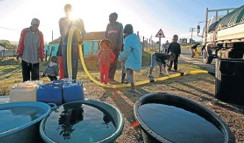
Zuma’s office sending team to assess situation in parched Grahamstown. Is it because they are better than us that Rhodes gets listened to?
AS is the case in many parts of South Africa, the lights often go out in Grahamstown.
But residents of this Eastern Cape university city do not just have to worry about candles when power fails, because they know it can also cause their taps to run dry — sometimes for as long as two weeks at a time.
A power line running to one of the reservoirs has a tendency to break down. Adding to the problem is the fact that the city’s water system, including pipes and pumps, are old and need to be replaced urgently. Also, the system is under pressure because of the city’s rapid growth.
Earlier this month the last of three functioning pumps at the Howisons Dam reservoir broke down. This caused a two-week water outage that affected most of Grahamstown, including residences at Rhodes University. It triggered a scathing open letter from the university’s vice-chancellor, Saleem Badat.
A team from President Jacob Zuma’s office will visit Grahamstown on Tuesday with local government MEC Mlibo Qoboshiyane to assess the situation.
Cacadu district municipality has pledged R3-million of the R6-million needed to refurbish pumps at the Grahamstown reservoirs.
Many residents are irritated that this was done only when the area’s biggest employer and ratepayer, Rhodes University, made a fuss. Others are pleased that action is being taken at last.
“A lot of us are grateful that Rhodes jumped in because it emphasised our anger. People have been talking to the municipality about this for years, but it just seems as if nothing was done,” said local resident Talitha Berriman.
Thandeka Ndlovu of Ethembeni informal settlement was livid about what she said was preferential treatment.
“We’ve been here since 1993 and our taps were installed in 2003, but there is hardly any water in them. Is it because they are better than us that Rhodes gets listened to?”
Grahamstown East, mostly made up of townships, has been one of the hardest-hit areas and residents there have been putting up with an intermittent water supply for at least six years. Queueing for water from a truck or trekking to communal taps has become a way of life for these people.
“It’s good that Rhodes complained and protested to expose our crisis,” said Mavis Nkani, 65. “We thank them because nothing would have been done and the municipality would still be telling us about old pipes.”
Grahamstown’s water network is fed by two reservoirs through water-treatment facilities Jan Kleynhans in the east and Waainek in the west.
In the east, the municipality has spent a R50-million Development Bank of South Africa grant on phase one of a project to increase capacity.
Makana municipality spokesman Mncedisi Boma said the council had indeed been taking action in the water crisis. This included the recent formation of a task team consisting of external stakeholders, including Rhodes, to work on the issue.
Boma said a business plan had been submitted to the Treasury for R90million for further work on the water infrastructure.
“Council has resolved that a technical team, including experts from Rhodes and other stakeholders who helped develop business plans, to address this once and for all.”
Boma added that the municipality had recently outsourced its water management to Amatola Water.
Grocott’s Mail, a local newspaper, has reported on two incidents in which locals died in shack fires that could not be controlled because of the lack of water. One of them, Nomakhaya Mahlaza, who would have turned 50 next year, burnt to death in her rented back-yard shack while neighbours stood by helpless because the communal taps were dry.
Mongezi Kondile, 54, of Fingo township, said he had grown used to getting up at 4.30am on weekdays just so he could make sure there is enough water for his family before he goes to work.
“I take my wheelbarrow and make trips to and from the community tap about 5km away,” he said.
Across town, private schools including Graeme College, Victoria Girls’ High School, St Andrews, Kingswood, and Diocesan School for Girls have had to invest in back-up systems as well.
Berriman, a house mother at one of the schools, said in summer this year the hostel had been left without water for about a week.
“We suffered and I had to make sure the 19 girls under my care bathed every night. Luckily we had a freshwater tank and we then sourced an urn to try to make sure the girls had some water to bath.”
Grahamstown businessman and resident Alaric Heim, the owner of a B&B, said although he had not been affected by the last outage, his business had been without water for three days when it was fully booked during this year’s Science Festival.
Boma said the interventions this week had nothing to do with Rhodes. He conceded that the problem was getting worse, but said the council was doing everything in its power to sort it out.
Pictures: GARY HORLOR PATIENCE IS ESSENTIAL: Residents of Fingo township on the outskirts of Grahamstown have become used to standing in line for water because of numerous problems that mean their taps are dry.
By: Sabelo Skiti
Article Source: The Sunday Times
